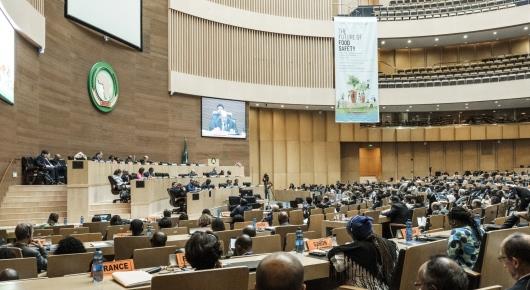Europe and Central Asia countries joined the global call for collaboration on food safety

Every year, foodborne diseases cause the illness of 600 million people worldwide and the premature death of 420 000. They also are behind productivity losses of USD 95 billion in low- and middle-income countries alone. To address these issues, FAO, the World Health Organization (WHO) and the African Union organized the First International Conference on Food Safety, held 12–13 February in Addis Ababa.
Countries of Europe and Central Asia were prominently represented among the 630 participants in total, with high-level representatives from the ministries of Albania, Armenia, Azerbaijan, Belarus, Kazakhstan, Kyrgyzstan, North Macedonia, Republic of Moldova, the Russian Federation, Serbia, Tajikistan, Turkey, Uzbekistan, and several European Union countries.
To ensure continuity of action, the International Forum on Food Safety and Trade – a joint event of FAO, WHO and the World Trade Organization – will follow up on trade-related aspects and food safety challenges on 23–24 April in Geneva.
The Addis Ababa conference concluded with the “Chairperson’s summary,” which highlighted the integral role of food safety in achieving the 2030 Agenda for Sustainable Development.
“There is no food security without food safety,” emphasized FAO Director-General José Graziano da Silva in his remarks, adding that “safeguarding our food is a shared responsibility. We must all play our part. We must work together to scale up food safety in national and international political agendas.”
Participating countries highlighted several issues that require national and regional action, such as integrating food safety into national and regional policies and plans for climate change; enhancing the participation of all countries in the standard-setting work of Codex Alimentarius; applying the multi-sectoral “One Health” approach; combatting antimicrobial resistance; and increasing investment in national food control systems.
Other key issues are adherence to adequate food safety management in the food sector; enhancing partnerships; ensuring that all countries can benefit from developments in food sciences and technologies; enabling consumers and civil society to engage in and contribute to food safety discussions; and raising public awareness.
Beyond these issues, the sector also would benefit from an improved evidence base for food safety decisions through systematic efforts to monitor foodborne hazards, contribute to global integrated data and share expertise.
“The two meetings are expected to result in stronger political will for increased support and in better coordination to address food safety globally,” said Mary Kenny, food safety and consumer protection officer at FAO’s Regional Office for Europe and Central Asia. “The wide and active participation from the region in the Addis Ababa conference is a highly encouraging sign for future efforts to strengthen food safety systems.”
FAO, is committed to build on the conferences’ momentum and continue working closely with member countries in the region to address food safety and quality challenges under its Regional Initiative on agrifood trade and market integration.
18 March 2019, Budapest, Hungary
